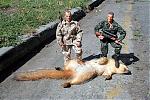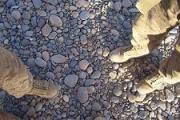October 26, 2011: If there were no foreign troops in Afghanistan, the Islamic terrorists would still be there. We have Pakistan to thank for this, which started down the road of Islamic radicalism in the 1950s, when the government changed the nation's name from Pakistan to the Islamic Republic of Pakistan. Then, in the 1970s, the Pakistani government, or at least the group of generals that were running the place at the time, decided to adopt Islamic terrorism as an official state policy, and aim it at India. In the 1980s, Pakistan launched this new weapon at the Russian troops who had invaded Afghanistan. After that was over in 1988, warlords, the nominal (communist) government in Kabul and Islamic radical groups went to war with each other, to decide who would rule the country. That was a stalemate, so in the 1994, to create an Islamic radical coalition and unite the Afghanistan with a government friendly to Pakistan, the Taliban was invented (by Pakistan, in Pakistan) and sent in to take control. That never quite worked out, as when the Americans invaded in late 2001, the Taliban were still trying to defeat non-Pushtun (the Taliban were basically Pushtun) tribes in the north.
The U.S. was mainly interested in destroying al Qaeda (which had organized the September 11, 2001 attacks in the U.S.). By 2011, the U.S. believed that al Qaeda was fading fast in Pakistan and Afghanistan, especially since the death of leader Osama bin Laden last May. An ally of al Qaeda in Pakistan, the Haqqani Network, was now seen as a larger threat, especially in Afghanistan. Based in North Waziristan (and adjacent areas). Haqqani has been at it for over two decades, and has long worked with Pakistani intelligence (ISI). Haqqani has been discreet, where the Taliban have not, and this has earned the group a measure of respect from Pakistani politicians and military commanders. Haqqani does not carry out terror attacks in Pakistan.
The Haqqani Network takes advantage of the fact that the border between Afghanistan and Pakistan (sometimes called the Durand Line) is only semi-official. That's because it was established in 1893, between the British colonial government in India, and the Amir (Islamic king) of Afghanistan. It was not meant to be a border, just a way of determining where the British and the Afghans would not carry out military operations. The Pushtun tribes divided by the Durand line were free to cross, and there was no real border patrol or guard. When formal border guards were established, by the new government of Pakistan in the late 1940s, it was applied lightly, as the local tribes did not, and many still do not, recognize the border. The Haqqani Network took advantage of this to establish bases in Pakistan, and friendly relations with local tribes. This enabled Haqqani to move terrorists and weapons into Afghanistan and carry out attacks. When pursued, all the Haqqani men had to do was get across the old Durand Line, and they were safe. With the CIA UAVs overhead now, that safety is no longer assured.
The Haqqani Network is led by Jalaluddin Haqqani, an Afghan from the eastern part of the country. He is now in his 60s, and runs a tight ship. He was a major warlord during the 1980s war with the Soviets, and a major player in the civil war that broke out after the Soviets left in 1989. But he quickly saw the power of the Taliban (being an Islamic conservative himself), and joined the Taliban shortly after he encountered them. But Haqqani kept his organization separate, and his head down. He carries out terror attacks mainly in eastern Afghanistan. Haqqani has long supported itself via criminal operations (extortion, robbery, kidnapping) and handouts from the Pakistani government. The ISI supports Haqqani because they see this group as a potential tool in gaining more control over Afghan tribes, and the Afghan government. The Pakistanis also rely on Haqqani for terrorist training (of terrorists willing to serve ISI.)
Haqqani has over 5,000 men under arms (but many are part-time fighters) and several hundred suicide bombers in training or ready to go. Haqqani can call on over 20,000 armed tribesmen in North Waziristan and adjacent areas. Again, these are largely part-timers, and have to be convinced to gather and fight. A threatened Pakistani Army invasion of North Waziristan would be convincing, and that has kept the Pakistani soldiers out so far. The only government forces in the area are the Frontier Constabulary, a border guard recruited from the local tribes. These guys guard the Afghan border in North Waziristan, but have an understanding with Haqqani men sneaking into or out of Afghanistan; they leave them alone. The Haqqani gunmen return the favor.
Despite protests from the Pakistanis, the U.S. has increased its use of missile armed UAVs to hunt down and kill terrorist leaders. These missile (mainly Hellfire) attacks have already killed or wounded several members of the Haqqani clan, and that will apparently increase. The Pakistanis want only al Qaeda and Taliban leaders attacked, because these two groups have been launching a growing number of terror attacks in Pakistan. But Haqqani has behaved itself, and Pakistan (at least the army and ISI) wants to keep it that way. But Haqqani also allows al Qaeda to use Haqqani facilities (camps, safe houses and so on). This doesn't bother the Pakistanis much, but the U.S. and Afghanistan are not happy with all the terrorism Haqqani sponsors and carries out Afghanistan. So Haqqani leaders are going to be seeing more Hellfire missiles up close and personal. Pakistan denies any knowledge or complicity with Haqqani terrorism.
The terrorist losses from these attacks have been severe, and include heads of operations, finance and intelligence. Many of the mid-level commanders were bomb making, and terror attack experts. These losses caused additional casualties as less skilled bomb makers died when their imperfect devices blew up while under construction. New bomb makers have been less successful because of poor instruction. The loss of operations commanders meant operatives were less effectively deployed, and more easily caught or killed. The damage to their intelligence operations meant there was less success in general, especially against the growing American informant network on the ground. The financial leadership losses have meant less income, and more reliance on stealing from locals, which makes the terror groups even more unpopular.
Pakistan cannot openly complain about all this, because it's no secret that Haqqani have long been operating a terrorism training operation, and carrying out attacks against real or imagined enemies. But Pakistan does continue to protect Haqqani any way it can. That includes keeping troops out of North Waziristan, and tipping off Haqqani about any American operations the ISI is able to get wind of. Normally, the U.S. tells ISI nothing about anti-terrorist operations. But ISI is, after all, an intelligence organizations, and has spies in Afghanistan, keeping an eye on the Americans and always seeking closely held information on operations against Haqqani.



 Reply With Quote
Reply With Quote








Bookmarks